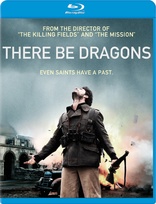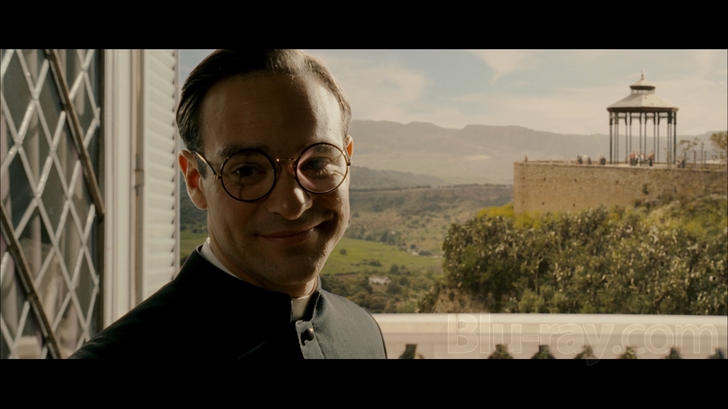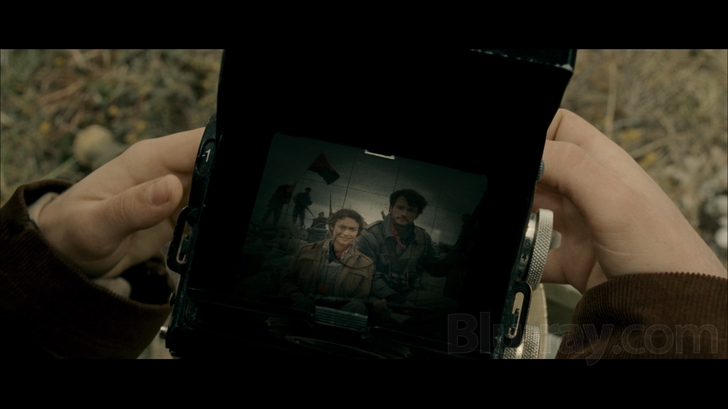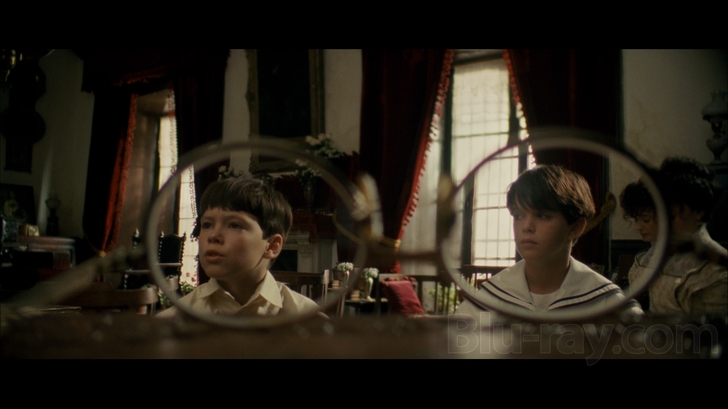There Be Dragons Blu-ray Movie
HomeThere Be Dragons Blu-ray Movie 
20th Century Fox | 2011 | 122 min | Rated PG-13 | Jan 10, 2012
Movie rating
6.4 | / 10 |
Blu-ray rating
| Users | 3.5 | |
| Reviewer | 2.5 | |
| Overall | 3.4 |
Overview
There Be Dragons (2011)
A young journalist long ago rejected by his now aged and dying father finds himself investigating one of his father's former friends, a candidate for canonization. Uncovering the two men's complicated relationship from childhood through the horrors of the Spanish Civil War unveils a compelling drama filled with passion, betrayal, love and religion. An action packed story set during a murderous time in history that ultimately serves the present by revealing the importance and timeless power of forgiveness.
Starring: Charlie Cox, Wes Bentley, Dougray Scott, Unax Ugalde, Olga KurylenkoDirector: Roland Joffé
| Drama | Uncertain |
| Biography | Uncertain |
Specifications
Video
Video codec: MPEG-4 AVC
Video resolution: 1080p
Aspect ratio: 2.35:1
Original aspect ratio: 2.39:1
Audio
English: DTS-HD Master Audio 5.1
Subtitles
English SDH, Spanish
Discs
50GB Blu-ray Disc
Single disc (1 BD)
Playback
Region A (B, C untested)
Review
Rating summary
| Movie | 2.5 | |
| Video | 4.0 | |
| Audio | 4.5 | |
| Extras | 1.5 | |
| Overall | 2.5 |
There Be Dragons Blu-ray Movie Review
Holy hagiography makes for boring storytelling.
Reviewed by Casey Broadwater January 11, 2012There have been a small handful of films about the Spanish Civil War produced in the last few years, and each views the conflict through a different
lens. Guillermo del Toro's dark fairytale, Pan's Labyrinth, examines the dangers of unyielding ideology by way of fantasy and imagination.
The Last Circus, from director Álex de la Iglesia, sees the war as a surreal battle between psychotic, diametrically opposed clowns, fighting for
the hearts and minds of the Spanish people. And now there's writer/director Roland Joffé's There Be Dragons, which takes a decidedly more
pious approach, using the war as an illustration for the necessity of forgiveness and reconciliation wherever there are disagreements and long-
standing grudges.
It's a deeply religious film by definition, a loose biopic of Josemaría Escrivá--the recently canonized Catholic priest who founded the Opus Dei
organization--and a meditation on divine love as the ultimate mediator between warring factions. Opus Dei members co-produced the movie, so you
can expect a certain amount of preachiness and and even some light historical whitewashing, but that doesn't bother me as much as Joffé's stilted,
over-obvious script and the generally wooden acting by a cast comprised largely of native English-speaking actors doing put-on Spanish accents.
There Be Dragons might be marginally more entertaining than catechism class, but that really isn't saying much.

Harry Potter: The Order of Opus Dei
The framework of the story involves Scottish actor Dougray Scott (Mission: Impossible II) as Robert, a journalist writing a book about Josemaría Escrivá's possible canonization, with help from his near-dead father, Manulo, played by American Beauty's Wes Bentley in ridiculously unbelievable old man makeup. The father and son haven't spoken to each other in years--this is a film about the importance of reconciliation, remember--but Manulo, who was a childhood pal and adulthood enemy of Escrivá, has some stories to tell about the future saint, along with some family secrets he'd like to get off his chest before he dies.
From here, the film is told mostly in flashbacks, with Manulo--a completely fictional character, I should mention--offering a pained and heavy-handed account of his and Escrivá's lives between 1911 and 1939. The two come from very different homes--Escrivá poor and Manulo a rich factory owner's son--and their friendship is severed early on by circumstance and opposed worldviews. As the troubles in Spain are mounting, the cherubic Escrivá-- portrayed by Charlie Cox in round Harry Potter glasses--joins the priesthood and creates Opus Dei, his new religious order of ordinary laypeople who set out to do "God's Work," caring for the less fortunate and seeking social justice. Meanwhile, Manulo becomes an embittered fascist spy embedded deep in a communist brigade, where he falls in unrequited love with Hungarian mercenary freedom fighter Ildiko (Olga Kurylenko), who spurns him for Oriol (Rodrigo Santoro), the group's fearless revolutionary leader.
Civil wars are categorically violent and ideologically complicated affairs, but the Spanish Civil War was messier than most, with landowner and Church- backed fascists on one side, anti-Catholic communists on the other, and atrocities all around, including the wholesale murder of clerics, atheists, and just about everyone in between. There's been some controversy in recent years regarding Escrivá's alleged support of the victorious Franco regime, but the film--as you might expect--portrays him as staunchly apolitical, concerned only with helping the poor and discretely taking confessions under the noses of leftist soldiers eager to sniff out priests.
And that's fine. Let the historians quibble over the details. The problem with Escrivá as a character in a film, however, is that he's so selfless, so good-natured and forgiving and impossibly beatific that he just isn't very interesting dramatically. Sure, there are some external narrative tensions--how Escrivá evades capture and sneaks out of the country through the Pyrenees, for instance--but there are no internal struggles here, no wrestling with his faith, no doubts or temptations or even worries. He's a blameless vessel, bright and always cheery, which may be a retrospective reflection of his eventual sainthood, but it's certainly dull on screen. Charlie Cox, so good recently in HBO's Boardwalk Empire, is forced to spend most of the film wearing a meek, oh, don't mind me expression, and the film's sole concession to Opus Dei's controversial practice of self-mortification--publicized in Dan Brown's Da Vinci Code--is a single blink-and-you'll-miss it shot of Escrivá flagellating himself while saying a prayer.
For a character that's less unbearably angelic and more recognizably human--with all of the suffering and uncertainty and dramatic gristle that that entails--we have to look to the vain, directionless Manulo, wracked by jealousies and anger. But even his story is limply told, recited with all the passion of a particularly dry priest reading off an announcement about a post-benediction potluck lunch in the church basement. If you thought Bentley was stiff in American Beauty, wait 'til you see him here, grimacing off into the distance, looking emotionally or otherwise constipated.
The inertness is unfortunate because There Be Dragons is quite a lavish production, with nostalgically-toned cinematography, period-perfect sets and costuming, and some genuinely impressive battle sequences. At first glance, everything about it screams "prestige wartime drama." But then the characters start speaking, often in tidy, church crowd-pleasing aphorisms, like Manulo's opening statement that "every saint has a past, and every sinner has a future." It's the kind of film that reminds you how easily uplifting and inspirational can slide into treacly and substanceless without a strong script and dead-on direction. Yes, Roland Joffé made The Killing Fields and The Mission--two masterful films with real spiritual significance--but this is also the guy that brought us the horrible 1995 version of The Scarlet Letter and 2007's "torture-porn" mishap, Captivity. (He's also rumored to have ghost-directed much of Super Mario Bros.) The phrase "wildly uneven" comes to mind, in regard to both Joffé's career and the handsomely filmed but dramatically flat There Be Dragons, which never really evokes the unknown danger and adventure of its title, a reference to the areas on antiquarian maps where mythical beasts were said to swim. A more suitable title? Here Be Doldrums.
There Be Dragons Blu-ray Movie, Video Quality 

There Be Dragons was shot on 35mm by Mexican cinematographer Gabriel Beristain, and 20th Century Fox has transferred his work to Blu-ray wonderfully, with a 1080p/AVC encode that's strong in clarity and color. If I have one niggling complaint--not even a complaint really, more of an observation--it's that the contrast curve can be quite heavily weighted in the shadows, resulting in some occasionally crushed detail during darker scenes. This is a stylistic decision as much as anything, though, and it never gets outright oppressive or eye-straining, so I don't see any cause for concern. Most importantly, the image looks natural. Grain is still visible, there are no problems with edge-enhancement, and compression/encode issues are limited to brief bursts of noise and some mild flickering/shimmer in two or three shots. There's a slightly soft quality to a few scenes--and some scenes that have been intentionally blurred toward the edges for effect--but the picture overall is more than adequately sharp, with tight high definition detail in all of the areas where you normally expect to see it. The tonality is great too, with a generally warm cast, balanced skin tones, and vivid flashes of color when called for, like the bright reds of the communists' flags and handkerchiefs.
There Be Dragons Blu-ray Movie, Audio Quality 

I have nothing but good to say about There Be Dragons' lossless DTS-HD Master Audio 5.1 surround track, which provides a good deal of energy to a film sorely lacking in liveliness. Obviously, the mix is at its most intense during the battle sequences, where bombs explode with satisfying subwoofer engagement, fighter planes strafe through the soundfield, and bullets crack loudly, whizzing between channels with enough intensity to make you jump in your seat. But even during quieter scenes the track shows an attention to detail by way of fairly immersive ambience, from traffic sounds and the jeers of a mob to the spirit-like gust of wind that opens Escrivá's window during a prayer session. Dynamically, the mix is full and balanced--neither tinny nor bass heavy--and there's a consistent sense of clarity and richness in the effects and score. The accents may stretch credulity, but the dialogue itself is clear and easily understood, with no muffling, crackles, or lowness. I don't think I had to adjust the volume on my receiver once during the film. For those that might need or want them, the disc includes optional English SDH and Spanish subtitles.
There Be Dragons Blu-ray Movie, Special Features and Extras 

- Facing Your Dragons: Inspiring Testimony from Wes Bentley (1080p, 3:57): Bentley discusses his own personal similarities to his character and the spiritual experience he had while making the film.
- Deleted Scenes (SD, 30:54): A long collection of cut scenes, none of which would've much improved the film.
There Be Dragons Blu-ray Movie, Overall Score and Recommendation 

With a fantasy-promising title like There Be Dragons, you might understandably be confused--going into the film blind--by this faith-infused wartime drama, which rather lifelessly portrays the life of Josemaría Escrivá, the Opus Dei founder who was canonized by the Catholic church in 2002. It's not a bad film, and I have no doubt that some Catholic viewers will sing its praises, but it just isn't as affecting or well-written as it could've been and should be. Though the curious might want to consider a one-time rental, this isn't the sort of purchase-worthy film that stands up to repeat viewings.
Similar titles
Similar titles you might also like

Hemingway & Gellhorn
2012

A Matador's Mistress
Manolete
2008

Nixon
Election Year Edition
1995

Flashbacks of a Fool
2008

Mogul Mowgli
2020

To Kill a King
2003

An Angel at My Table
1990

The Benefactor
2016

Colette
2018

Papillon
2017

Coco Before Chanel
Coco avant Chanel
2009

At Eternity's Gate
2018

Paris, Texas 4K
1984

Heaven Knows What
2014

A Master Builder
2013

Chattahoochee
1989

My Ain Folk
1973

My Childhood
1972

To Kill a Mockingbird 4K
60th Anniversary Edition
1962

The Life of Emile Zola
Warner Archive Collection
1937